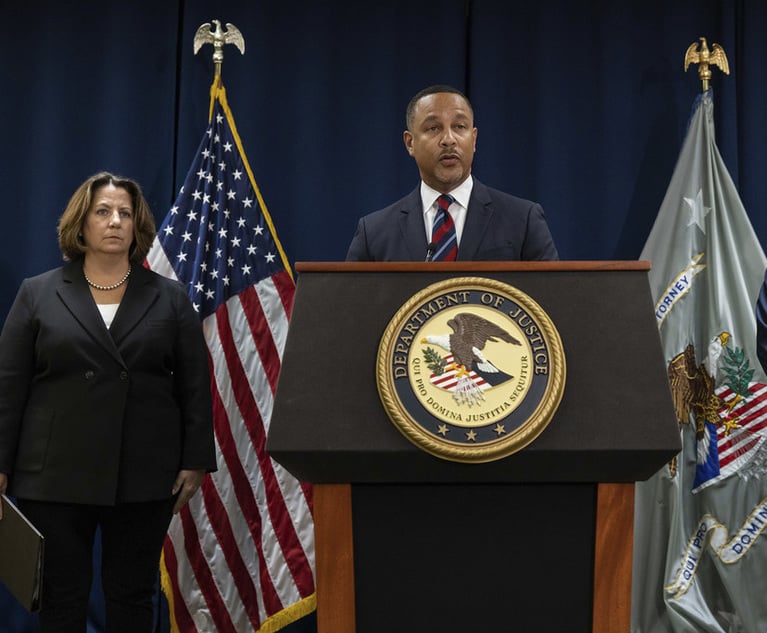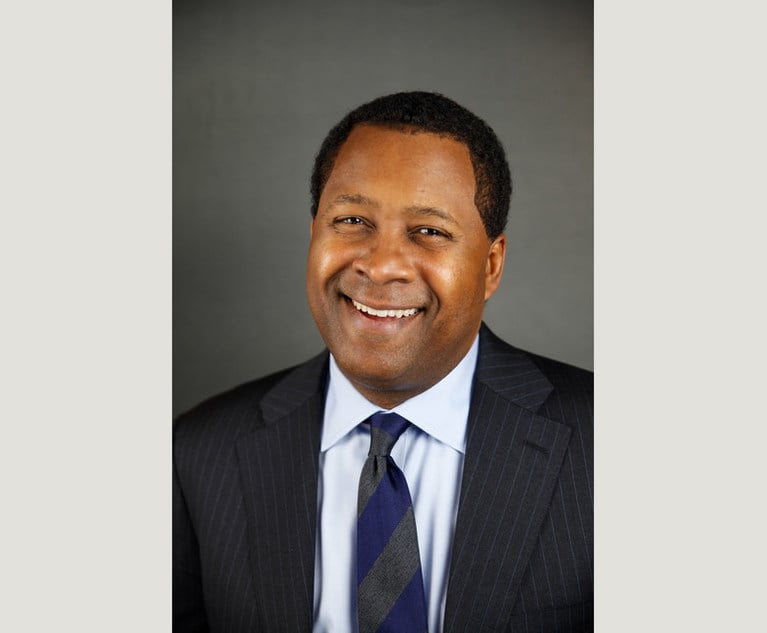Compliance Hot Spots: Takeaways on the 2nd Circuit's Big FCPA Ruling | Surviving the Move In-House | Plus: Who's Lobbying on Privacy?
Law firms are buzzing about the import of the 2nd Circuit's big FCPA ruling, and check out who's lobbying on privacy. Plus: scroll down for the latest Who Got the Work. This is Compliance Hot Spots.
September 04, 2018 at 09:00 PM
9 minute read
Welcome to Compliance Hot Spots, our briefing on compliance, enforcement and government affairs. Getting back from the long weekend, we've got some early thinking on the 2nd Circuit's ruling limiting the reach of the Foreign Corrupt Practices Act. Plus: The United Kingdom' Serious Fraud Office has picked a Justice Department veteran to serve as its next leader, and the state-legal cannabis industry is pushing back against the Internal Revenue Service's broad powers. Scroll down for new appointments and new hires.
As always thanks for reading—and please do send feedback. I appreciate hearing from you about what's on your plate—observations, trends, new clients. I'm at [email protected] and 202-828-0315, or follow me on Twitter @cryanbarber.
The Curious Case of Lawrence Hoskins
The U.S. Court of Appeals for the Second Circuit made waves in its recent decision limiting the reach of the federal law against overseas bribery. The dearth of big-ticket rulings on the Foreign Corrupt Practices Act ensured this decision would get some attention.
Law firms sent out client alerts summarizing the court's view that a foreign national cannot be held liable for violating the FCPA if the individual is not working at the behest of a U.S. company and has not done anything to violate the anti-bribery law while in the United States.
Some background on the case: Lawrence Hoskins, a former officer at the British subsidiary of the French multinational engineering company Alstom S.A., was charged in 2014 with facilitating bribes to Indonesian government officials to secure a contract to construct a power plant. Alstom reached a settlement with the Justice Department that year, as did several individuals who were charged. Hoskins pleaded not guilty and has been defending against the government's charges in Connecticut federal court.
Clifford Chance partner Christopher Morvillo argued for Hoskins. Boiled down, the Second Circuit decision narrows the U.S. government's jurisdiction in the enforcement of foreign bribery.
But will it make a meaningful difference for white-collar defense lawyers and clients caught up in FCPA investigations?
Maybe not. In a recent post on the New York University School of Law's Compliance & Enforcement blog, a team from Debevoise & Plimpton—including Kara Brockmeyer, who previously led the Securities and Exchange Commission's FCPA unit—said the decision would have a “narrow practical impact for many foreign nationals.”
The Debevoise lawyers wrote: “With Hoskins, the Second Circuit has limited the FCPA's extraterritorial reach somewhat, but has left the door open for conspiracy claims against a non-resident foreign national as long as the government also establishes that the foreign national is an agent of an issuer, domestic concern, or another foreign national who acted in furtherance of a bribe payment in the territory of the U.S.” They added: “The number of individuals who fall in the group affirmatively beyond the scope of the FCPA after Hoskins may end up being relatively small.”
Plus, there's the fact that the decision is only binding in the Second Circuit.
>> Where there might be a significant impact: The U.S. government's jurisdiction over foreign companies that enter into joint ventures with American companies.
“Historically, DOJ charged the foreign [joint venture] partners with conspiracy to violate the FCPA,” Debevoise & Plimpton wrote. “However, the Second Circuit's decision in Hoskins would clearly preclude this, and require the government to prove that the foreign national acted as an agent of a U.S. issuer or domestic concern. Given the complexity of international [joint venture] structures, it likely will be difficult for the government to prove that a [joint venture] partner acted as an agent of its U.S. [joint venture] partner rather than of the [joint venture] itself.
>> What's next for Hoskins? The Justice Department can challenge the Second Circuit's ruling—either to an en banc sitting of the court or to the Supreme Court—or plow forward in the U.S. District Court for the District of Connecticut. If the Second Circuit's ruling stands, the Justice Department will have to prove that Hoskins was an agent of the U.S. subsidiary—a point he contests.
Who Got the Work
>> Paris-based pharmaceutical company Sanofi, represented by Weil, Gotshal & Manges LLP partner Steven Tyrrell, agreed on Tuesday to pay more than $25 million to resolve SEC foreign-bribery claims. “The schemes spanned multiple countries and involved bribe payments to government procurement officials and healthcare providers in order to be awarded tenders and to increase prescriptions of its products,” the agency said in a statement. Read the agency's order here.
>> The Information Technology Industry Council, a trade group funded by the likes of Amazon.com Inc. and Microsoft, is pushing for a federal privacy law in hopes of preventing a patchwork of state laws and any imitation in the United States of the sweeping regulations adopted abroad. That means business for the consulting firm Mehlman Castagnetti Rosen & Thomas, which ITI paid $80,000 through the first half of the year to lobby on email privacy and reforms to the Electronic Communications Privacy Act, among other issues. The National Law Journal has more here on the lawyers behind the industry's lobbying push.
>> Michael Schwartz, a Philadelphia-based partner at Pepper Hamilton, is defending former NFL star Mychal Kendricks against insider-trading charges. The SEC accused Kendricks, a linebacker who's played for the Philadelphia Eagles and Cleveland Browns, of reaping $1.2 million in illegal profits by purchasing securities in companies that were soon to be acquired and then selling his positions after the deals were publicly announced. The Browns released Kendricks on the news of the charges. [ESPN]
Compliance Reads: New Leader at UK's SFO; How to Survive the Move In-House
>> The U.K.'s Serious Fraud Office has a new leader—Lisa Osofsky, whose legal career has included stints at the U.S. Justice Department and the FBI. The Wall Street Journal reports: “Lisa Osofsky, who has worked at the U.S. Department of Justice and Federal Bureau of Investigation, said she would continue strengthening cooperation across government bodies and the private sector, in the way she said has long been the case in America.” My colleagues at Legal Week have more on Osofsky's arrival at the Serious Fraud Office. Osofsky was previously Europe, Middle East and Africa head of investigations at regulatory compliance company Exiger.
>> How to survive a move in-house—tips from a lawyer who's been there. William Kruse, regulatory compliance officer at global management consulting firm Gallup Inc., tells Corporate Counsel some advice for lawyers making the jump: “Be careful in the first 100 days. There are a lot of things that, when you move to being in-house counsel, you're not prepared for in those first three months.”
>> Cannabis shops are pressing claims against the IRS over the agency's sway in the nascent industry. My colleague Cheryl Miller's got a report at The Recorder on a case on appeal at the Tenth Circuit. Lawyers for the IRS contend the challengers are “scaremongering” about the broad powers of tax enforcers. You can read the government's brief here.
>> “California is quickly becoming home to a fight over data collection between big tech and consumers,” my colleague Ian Lopez writes on Law.com. That fight has found its way into the courts, most recently with a pair of class action lawsuits against Facebook alleging that the tech giant has improperly shared user data with mobile device makers. The class actions come in the aftermath of the revelation that Facebook allowed Cambridge Analytica to mine user data on the platform, a scandal that brought on multidistrict litigation against the social media company.
New Appointments, Hires & Promotions
>> WilmerHale's Dan Berkovitz, former co-chair of the firm's futures and derivatives practices, was confirmed recently to a seat on the U.S. Commodity Futures Trading Commission. We've got Berkovitz's financial disclosure and ethics pledge.
>> Jones Day has picked up Laura Pruitt as a Washington partner in the financial institutions litigation and regulation practices. Pruitt previously held posts at the U.S. Securities and Exchange Commission, including senior counsel in the general counsel's office. Tony Dias, who co-leads the financial institutions litigation and regulation practice said in a statement: “The current regulatory environment leaves financial and securities market participants potentially vulnerable to a wide range of complicated investigations, enforcement actions, and regulatory compliance issues. Laura's broad experience, in both the private sector and in public service, make her a particularly strong addition to what is already a very effective practice.”
>> Courtney Robinson, a former senior counsel for Democrats on the U.S. House Financial Services Committee, has joined Square—the financial services and mobile payments company founded by Twitter's Jack Dorsey. Before working on the Hill, Robinson was a policy counsel at the Center for Responsible Lending. “We are thrilled to welcome Courtney to the Square team,” said Chris Massey, head of Square's global government relations and policy, in a statement. “Her experience in financial services and working with organizations that fight for underserved communities aligns perfectly with Square's purpose of economic empowerment.”
>> Trisha Anderson, a former principal deputy general counsel at the FBI, has returned to Covington & Burling, where she'd previously been an associate. Before joining the FBI in 2015, Anderson served as assistant general counsel for enforcement and intelligence at the Treasury Department. At Covington, she'll focus on national security and government enforcement matters. “Trisha is a leading light in the complex and multi-dimensional field of national security law, an area that is increasingly important for the private sector, both in the U.S. and abroad,” said Covington & Burling partner Jim Garland, a leader of the firm's national security practice. “Trisha's expertise, judgment, and experience in government over the past decade will be a tremendous asset to the firm and our clients. We are thrilled that she has returned home to Covington.”
This content has been archived. It is available through our partners, LexisNexis® and Bloomberg Law.
To view this content, please continue to their sites.
Not a Lexis Subscriber?
Subscribe Now
Not a Bloomberg Law Subscriber?
Subscribe Now
NOT FOR REPRINT
© 2025 ALM Global, LLC, All Rights Reserved. Request academic re-use from www.copyright.com. All other uses, submit a request to [email protected]. For more information visit Asset & Logo Licensing.
You Might Like
View All
Compliance Hot Spots: GOP Eyes ESG as an Antitrust Issue + Another DOJ Crypto Seizure + Sidley Partner Jumps to Main Justice
9 minute read
Compliance Hot Spots: Lessons from Lafarge + Fraud Section Chief Talks Compliance + Cravath Lands FTC Commissioner
11 minute readTrending Stories
- 1Evidence Explained: Prevailing Attorney Outlines Successful Defense in Inmate Death Case
- 2The Week in Data Jan. 24: A Look at Legal Industry Trends by the Numbers
- 3The Use of Psychologists as Coaches/Trial Consultants
- 4Could This Be the Era of Client-Centricity?
- 5New York Mayor Adams Attacks Fed Prosecutor's Independence, Appeals to Trump
Who Got The Work
J. Brugh Lower of Gibbons has entered an appearance for industrial equipment supplier Devco Corporation in a pending trademark infringement lawsuit. The suit, accusing the defendant of selling knock-off Graco products, was filed Dec. 18 in New Jersey District Court by Rivkin Radler on behalf of Graco Inc. and Graco Minnesota. The case, assigned to U.S. District Judge Zahid N. Quraishi, is 3:24-cv-11294, Graco Inc. et al v. Devco Corporation.
Who Got The Work
Rebecca Maller-Stein and Kent A. Yalowitz of Arnold & Porter Kaye Scholer have entered their appearances for Hanaco Venture Capital and its executives, Lior Prosor and David Frankel, in a pending securities lawsuit. The action, filed on Dec. 24 in New York Southern District Court by Zell, Aron & Co. on behalf of Goldeneye Advisors, accuses the defendants of negligently and fraudulently managing the plaintiff's $1 million investment. The case, assigned to U.S. District Judge Vernon S. Broderick, is 1:24-cv-09918, Goldeneye Advisors, LLC v. Hanaco Venture Capital, Ltd. et al.
Who Got The Work
Attorneys from A&O Shearman has stepped in as defense counsel for Toronto-Dominion Bank and other defendants in a pending securities class action. The suit, filed Dec. 11 in New York Southern District Court by Bleichmar Fonti & Auld, accuses the defendants of concealing the bank's 'pervasive' deficiencies in regards to its compliance with the Bank Secrecy Act and the quality of its anti-money laundering controls. The case, assigned to U.S. District Judge Arun Subramanian, is 1:24-cv-09445, Gonzalez v. The Toronto-Dominion Bank et al.
Who Got The Work
Crown Castle International, a Pennsylvania company providing shared communications infrastructure, has turned to Luke D. Wolf of Gordon Rees Scully Mansukhani to fend off a pending breach-of-contract lawsuit. The court action, filed Nov. 25 in Michigan Eastern District Court by Hooper Hathaway PC on behalf of The Town Residences LLC, accuses Crown Castle of failing to transfer approximately $30,000 in utility payments from T-Mobile in breach of a roof-top lease and assignment agreement. The case, assigned to U.S. District Judge Susan K. Declercq, is 2:24-cv-13131, The Town Residences LLC v. T-Mobile US, Inc. et al.
Who Got The Work
Wilfred P. Coronato and Daniel M. Schwartz of McCarter & English have stepped in as defense counsel to Electrolux Home Products Inc. in a pending product liability lawsuit. The court action, filed Nov. 26 in New York Eastern District Court by Poulos Lopiccolo PC and Nagel Rice LLP on behalf of David Stern, alleges that the defendant's refrigerators’ drawers and shelving repeatedly break and fall apart within months after purchase. The case, assigned to U.S. District Judge Joan M. Azrack, is 2:24-cv-08204, Stern v. Electrolux Home Products, Inc.
Featured Firms
Law Offices of Gary Martin Hays & Associates, P.C.
(470) 294-1674
Law Offices of Mark E. Salomone
(857) 444-6468
Smith & Hassler
(713) 739-1250














